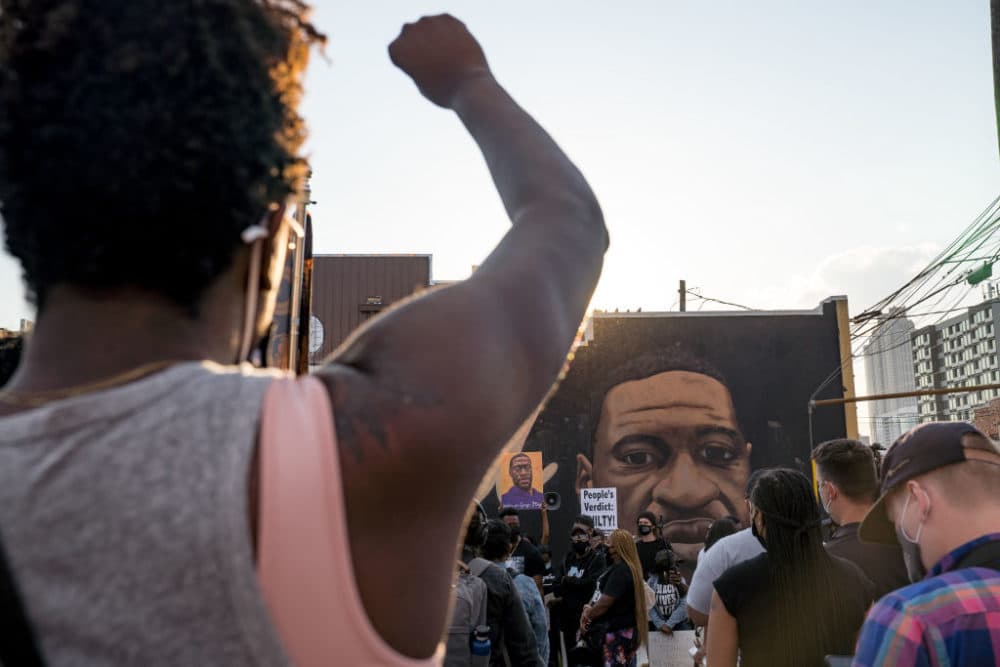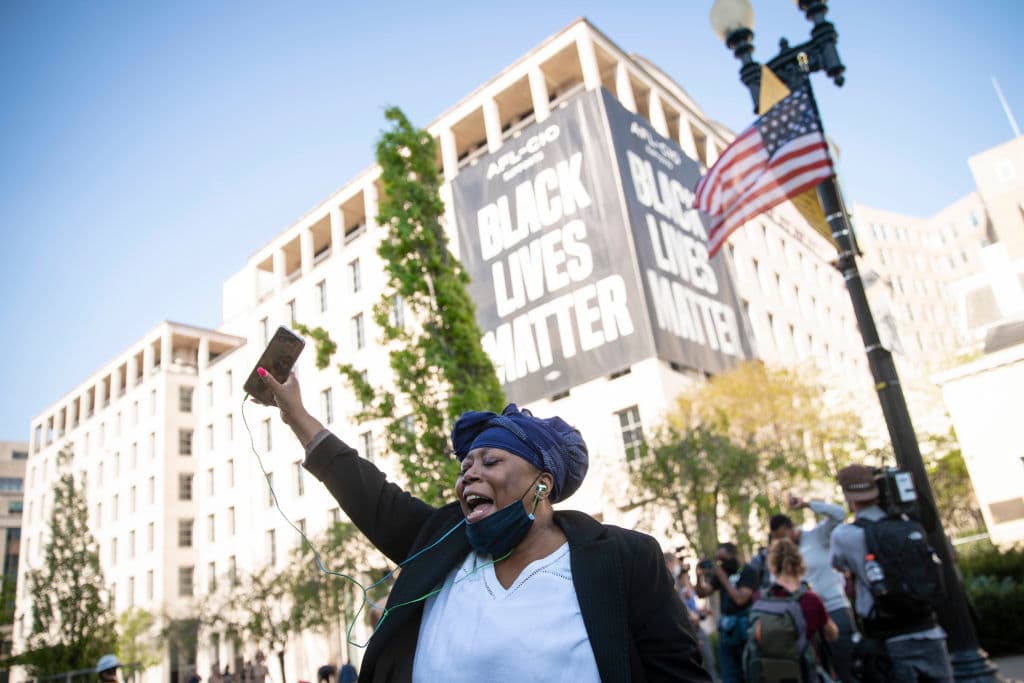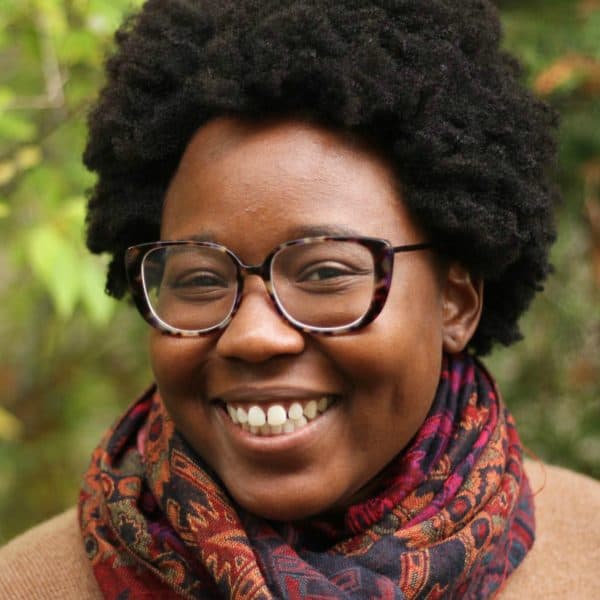Advertisement
Commentary
'What It Felt Like Was Stillness': Finally, Accountability For The Murder Of George Floyd

Like picking shards of glass from an open, still bleeding wound, I decided to watch the trial of Derek Chauvin, for the murder of George Floyd, in its entirety. My mom was watching, too, from her home in Milwaukee — we would call and text each other when we needed to check in, to reattach ourselves to something less horrifyingly unstable.
I wrote posts on social media about it, texted updates to friends. I watched every minute. Even Day 10 (which happened to be the day after my second COVID shot) when the debate about whether the medical examiner meant what he said on the death certificate became the soundtrack to my fever dreams from the couch.
Most folks I know, especially Black folks, could not bring themselves to watch. But for 14 days, I — and the jury — watched a man being murdered in the street from every angle imaginable, on a patchwork of what seemed like a dozen separate videos. “You can believe your eyes,” the prosecutors reminded us. It was traumatizing. I had nightmares. I kept my TV on mute as the videos played over and over again — and I never shared those images in any of my social media updates on the trial. I respected how triggering it was for people, and I knew my decision to watch was an unpopular one.
The near-solitude of experiencing the trial as a panacea began to remind me of how I feel every summer.
But I watched because somehow, it began to feel like healing. The trial made tragedy into science, policy and mundane courtroom procedure. This is what oxygen does. This is how our skeletons are designed. Touch your neck. You can feel it. This is how the body works, this is how it breaks. This is what communities do, this is how we met. Can I tell you the story?
The near-solitude of experiencing the trial as a panacea began to remind me of how I feel every summer.
I love fireworks. I'm not a huge fan of them just being randomly noisy in the middle of the day, but I live for street fireworks on summer nights. It’s one of my favorite traditions. I hear a crash or see a flash of light and I bolt to the nearest window to catch a glimpse. For years, I’ve stayed up to the wee hours on the 4th of July, driving around the streets of southern Boston — Roslindale, Dorchester, Mattapan — hunting for neon shows in the sky, set to life from stacks of explosives piled haphazardly at the end of someone's driveway, or from the curb at an intersection.
Last summer, there were a lot of fireworks. Some were in protest over George Floyd being murdered. Some were just to party. Last summer, when pain publicly inflicted on Black men was inescapable, I enjoyed my late-night 4th of July hunt for fireworks more than ever. Almost everybody I saw setting them off were Black men. When I'd roll down my window to thank them, they'd say, You're welcome, Ma. It felt like the most beautifully defiant demonstration of joy. Lighting up the sky. So loud that no one could sleep.
Advertisement

“I love fireworks so freaking much,” I shared the next day on Facebook. A white woman commented to remind me that fireworks are triggering for many people, and even more so for dogs. I privately lamented to some friends in a group chat how incredibly tired I am of how quick white folks — of all political persuasions — are to defend animals. How my neighbors have asked for trigger warnings on social media images of meat at the local butcher. On the same social media where it is literally commonplace to watch videos of Black men being murdered.
"The frequency with which I feel like I need to compare my worth against that of an animal to liberal white people is like, really really frequent," I said to my friends.
A member of my group chat, who’s white (although indigenous to Eastern Europe) and a self-proclaimed lefty chimed in, "If it’s exhilarating to talk about how this or that group of people aren’t getting the empathy animals are, I don’t want to be a part of it."
I went silent. Because that's the thing. The mere suggestion that we as a society treat dogs better than we do Black people crosses the line.
I was reminded of this exchange the day Chauvin’s jury began to deliberate, as I doom-scrolled to quell my anxiety over how long it might take them to reach a verdict. I came upon a Facebook post positing, “If that was a dog under the officer’s knee, the entire country would be outraged.” It's so true. Just imagine. Imagine the outrage had George Floyd been a dog. What if the rally cry was Dog Lives Matter? What if George Zimmerman had shot a dog in the street instead of Trayvon Martin? Would there be any national debate over the validity of that social movement?
Right now, I just want fireworks, and I don’t care if no one can sleep. I don’t care if the war isn’t over. I want to celebrate this battle.
After deliberating for a little more than 10 hours, the jury reached their decision. Guilty on all three charges. I heard horns honking in the street outside my window, heard some neighbors noisily whooping from relief. I watched Judge Cahill read the verdict twice. I texted my family. Some friends. I don't know what I was expecting to feel, but what it felt like was stillness. Suddenly, everything was so quiet, I could hear myself breathing.
Like many, I took to social media to post about the verdict. “Guilty. A big hill on a long journey,” I said. “A victory would be George Floyd being alive,” poet Amanda Gorman tweeted. “Verdicts are no substitutes for policy change,” AOC reminded us. “While today’s verdict is a small win for police accountability and may help heal a grieving community, the systems that allowed George to be murdered remain fully intact,” the ACLU shared. Because that’s the thing — even our relief is temporary.
And we’re not wrong. But dang. I don’t really want to think about that right now. Right now, I just want fireworks, and I don’t care if no one can sleep. I don’t care if the war isn’t over. I want to celebrate this battle.
“What a day to be a Floyd, man,” George Floyd’s brother Terrance said after the verdict. Around the same time he uttered these words, police in Columbus, Ohio shot and killed 16-year-old Ma’Khia Bryant, after she called them for help.
Man. I just wish it could be a good day for a while.
This segment aired on April 22, 2021.
